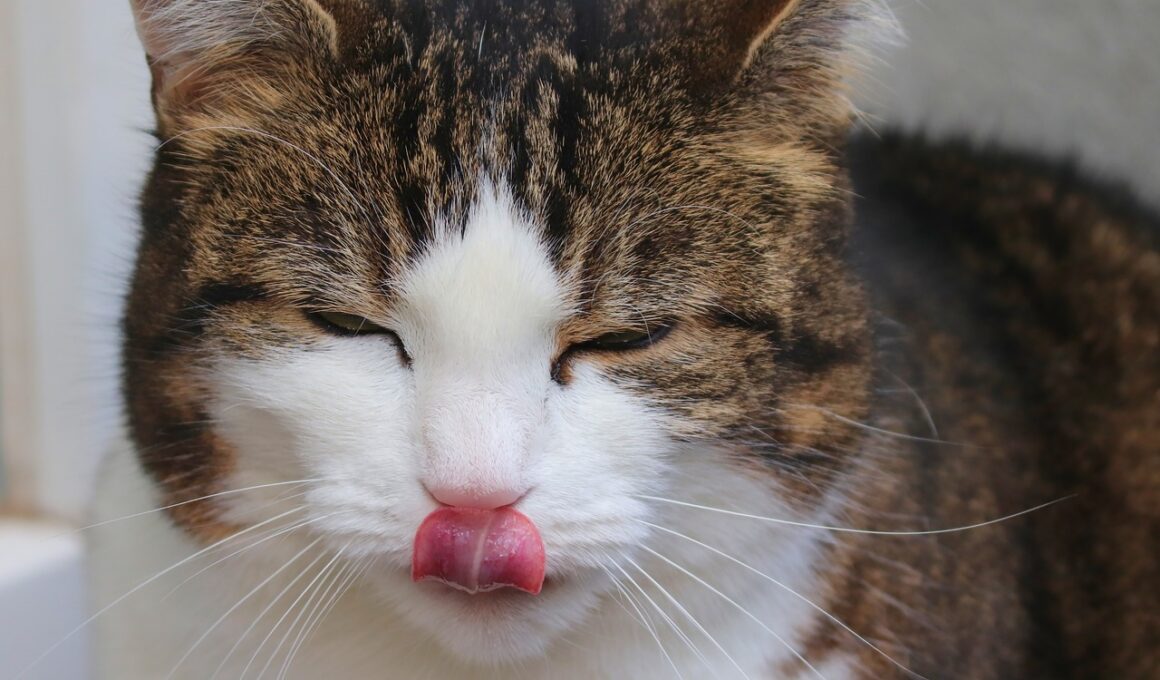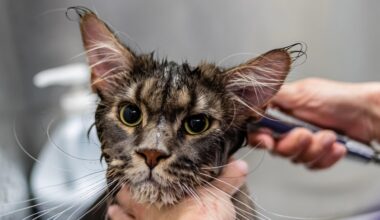Appetite-Boosting Supplements for Senior Cats
As cats age, their nutritional needs evolve significantly. Many senior cats experience a reduced appetite, potentially leading to unwanted weight loss and health issues. In these cases, appetite-boosting supplements can play a vital role in maintaining their overall well-being. Various options are currently available on the market to help stimulate your cat’s interest in food. These supplements typically contain natural ingredients that promote digestive health and enhance taste appeal, making meals more enjoyable for your beloved feline. It’s crucial to select high-quality products specifically tailored for senior cats. Consult with your veterinarian before introducing any new supplement to ensure it complements your cat’s specific health conditions. They can also recommend the best products based on your cat’s overall health and dietary restrictions. Remember, maintaining a balanced diet is essential to your cat’s health. An appetizing meal can provide essential nutrients to maintain their energy and vitality. With the appropriate supplements, you can improve your senior cat’s appetite, leading to healthier and happier outcomes for your furry friend. Ensuring your cat receives love and nourishment during their golden years is incredibly important.
Some popular types of appetite-boosting supplements for senior cats include nutritional gels, powders, and flavored kibble. These products are designed to be palatable and enticing to animals that show reluctance to eat. For instance, nutritional gels are typically rich in calories and filled with essential vitamins and minerals, ensuring that your cat gets the nutrition they need, even when their appetite is low. Similarly, flavored powders sprinkled over regular food can enhance the taste of the meal, making it more appealing to your cat. Furthermore, there are specialized foods available in the form of bite-sized morsels, specifically created to attract the attention of older cats. These tiny, tasty treats usually contain added nutrients that can aid in digestion and overall health. It’s important to choose supplements without artificial additives and harmful chemicals. Look for products that highlight natural ingredients, as they can provide safer alternatives for your pets. Regular consultations with your vet will help monitor your cat’s health and ensure the selected supplements meet their needs. Ultimately, your efforts to enhance your senior cat’s appetite can greatly impact their quality of life.
Feeding routines and meal environment also greatly influence an older cat’s appetite. Establishing a consistent feeding schedule encourages regular eating habits, allowing cats to anticipate mealtimes. When a cat knows when to expect food, it can help stimulate their natural hunger cues. The dining environment can also affect their willingness to eat. Ensuring the feeding area is quiet, clean, and free from distractions can encourage a senior cat to consume their meals. Using raised feeding bowls can also benefit some aging felines, as it relieves strain on their neck. This adjustment can help make meals more enjoyable and less stressful, promoting regular eating patterns. Additionally, enriching the cat’s environment by varying the food textures and flavors can entice them to eat more reliably. Offering a mix of wet and dry food can make mealtimes more interesting. Engaging their senses through exploration and play can also help increase interest in food. Interactive feeding toys can promote mental stimulation while encouraging your cat to work for their food. Thus, a multi-faceted approach that combines supplements with behavioral and environmental strategies can prove most effective in combating appetite loss.
Evaluating the Effectiveness of Supplements
Determining whether appetite-boosting supplements are working can be easily assessed through observation. Monitoring your cat’s eating habits closely and recording any changes can help gauge their response to the introduced supplements. If your cat becomes more eager to eat or shows a consistent increase in their food intake, this indicates success. However, it’s essential to keep in mind that some cats may take time to adjust. Some may need gradual introductions to new flavors or textures before they feel comfortable eating. Take note of any potential side effects, as they may indicate an adverse reaction to specific ingredients. Any gastrointestinal upset, such as vomiting or diarrhea, should be reported to your veterinarian promptly. Moreover, regular veterinary check-ups can help assess whether your cat’s overall health is improving as a result of the supplements. Routine blood work can indicate nutrient absorption efficiency, allowing for adjustments in the dietary approach if necessary. Being proactive and observant about your cat’s well-being will ultimately help ensure optimal health during their twilight years.
Aside from appetite-boosting supplements, consider adjusting your senior cat’s overall diet to meet their changing needs. Many pet food manufacturers create specialized formulations catering to senior cats, which often have balanced nutrition that supports their aging bodies. Look for products that contain added fiber to support digestive health and maintain a healthy weight. Furthermore, high-quality proteins are critical as they help build and repair tissues, contributing to overall vitality. Remember that hydration is equally important; older cats may become prone to dehydration, especially if they consume predominantly dry food. Therefore, offering wet food varieties can augment their fluid intake significantly. Additionally, fresh water should always be readily available to encourage drinking. Using cat fountains can entice some felines to drink more due to the flowing water they naturally prefer. Consider integrating moistening dry kibble with water or low-sodium broth as another hydration strategy. Evaluate the calorie content in senior cat foods as they generally require fewer calories due to lower activity levels. This understanding ensures maintaining an appropriate diet catering to their overall health and happiness needs.
Consulting Your Veterinarian for the Best Advice
Finding the right approach for sustaining your senior cat’s appetite is crucial for their health. Collaborating with your veterinarian is invaluable in making tailored recommendations specific to your cat’s unique conditions and the changes associated with aging. Veterinarians can help identify potential underlying health issues contributing to the decreased appetite. Conditions like dental disease, kidney issues, or gastrointestinal disorders may alter a cat’s willingness to eat. Treating any underlying problems may sometimes resolve appetite concerns. Additionally, discussing the use of supplements allows for a more personalized nutrition plan that complements your cat’s existing diet. Vets can recommend specific formulations that are safe and beneficial to incorporate alongside appetite-boosting supplements. Furthermore, tracking changes in weight, health status, and mood is important, as they can all reflect how well the supplements are working. Regular follow-ups will help fine-tune your approach, ensuring your senior cat’s needs are met. Their well-being should always be a priority, so investing time in your cat’s nutrition will foster a long and fulfilling companionship.
By incorporating suitable appetite-boosting supplements and understanding their impact, helping your senior cat maintain a healthy appetite can significantly enhance their quality of life. In conjunction with veterinary advice and adopting appropriate feeding practices, these supplements can aid in ensuring they receive the nutrients required to thrive. Enhancing food texture, flavor, and presentation is important in keeping meals exciting for your feline pals. As you navigate through their golden years, employing a mix of strategies enriched with love and attention will contribute to their well-being. Remember to monitor their habits and behavior, adjusting as necessary, which showcases the care you have for your older cat. With a mindful approach, even the fussiest eaters can return to enjoying their meals once more. This simple act of nourishing them will have a lasting impact on their happiness. Thus, remain patient and responsive to their specific needs, making all the difference as they age gracefully. Recognizing the uniqueness of your senior cat’s dietary requirements paves the way for a long-lasting, delightful companionship that continues to thrive with nourishment.


